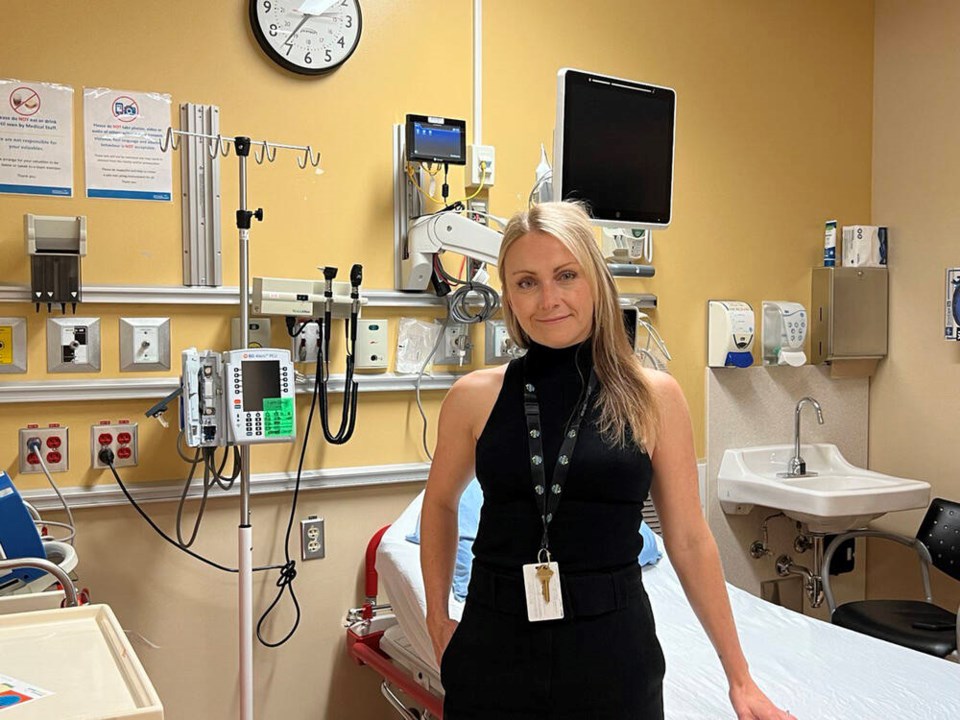North Vancouver’s Lions Gate Hospital has launched a medical unit specialized in providing forensic nursing care to survivors of human trafficking, domestic violence and sexual assault.
Beyond providing the expected nursing care, the unit offers graduating levels of examination that could help when a victim’s case comes before the courts.
“Our services are very patient-centred and patient-driven, so they are dependent on the survivor and what they would like,” said Jacquie Miller, co-ordinator for the forensic nursing services program at LGH.
Victims of assaults who come to LGH can select from one of the three courses of action for their forensic nursing care. The first option is to only receive medical care such as medications for sexually transmitted infections or HIV exposure from a sexual assault, emergency contraception, or physical assessments of injuries, including X-rays, imaging, or blood work.
The second option involves both medical care and forensic assessment, including a head-to-toe physical examination, documenting injuries and the survivor’s account of what happened.
“We store the evidence in a locked, on-site forensic freezer for up to a year without reporting to the police,” Miller said. “This is a really good option for those patients who don’t know if they want to report to the police and are just sure they want the medical care but don’t know how far they want to go in the judicial or legal system with the case.”
The third choice combines medical care, forensic assessment, and reporting to the police, with the forensic nursing services program assisting in evidence collection and transfer to law enforcement. But, the work must be done within one week of an assault because the likelihood of obtaining any useful DNA drops as time goes on
“And we don’t want to subject people to additional exams or assessments that could be potentially retraumatizing to them,” Miller said.
LGH’s forensic nursing services does not have mandatory reporting for the majority of cases that come in and Miller emphasized that anything patients share with the unit remains confidential.
“It is commonly thought that presenting to our program requires reporting to the police, which is not true. While we collaborate closely with law enforcement and appreciate their support, visiting us does not mean we will automatically involve the police. We offer a safe, confidential space where individuals can seek care whenever they need it,” said Miller, who has worked as a sexual assault nurse examiner for the past six years. “Everyone should know that their care is self-directed. They are taking control of their own bodies and health during a hospital experience. No referral is necessary to access our program. All someone needs to do is arrive at the emergency department.”
The forensic nurses do their sensitive work in designated areas enclosed by walls rather than curtains, well out of the general public’s line of sight to ensure the utmost privacy.
Â鶹´«Ã½Ó³»Coastal Health brought the program to Lions Gate for a soft launch in April of this year. Previously, patients needing forensic care would be sent to Â鶹´«Ã½Ó³»General Hospital.
“Which is certainly a barrier for some people,” Miller acknowledged. “They can just seek assistance locally when they need it.”
All 12 female forensic nurse examiners at LGH work on a casual on-call basis. They completed their certification through a six-week program at the British Columbia Institute of Technology, followed by an additional two weeks of specialized training in pelvic exams also offered by BCIT. By this fall, they all should also have completed Indigenous cultural safety training as well.
“Most members of the team live on the North Shore, so they’re deeply committed to offering safe services to fellow community members. They’re also easily accessible if anyone needs their assistance,” Miller said. “We will collaborate closely with Indigenous patient navigators within the hospital and throughout VCH to ensure culturally safe care for our patients.”
The forensic nursing services hours are currently limited to Monday through Thursday, from 7 a.m. to 5 p.m., with extended availability on evenings and weekends. The goal is to have the services available around the clock by this fall.
Fatemeh Falah is an intern reporter with the North Shore News. She can be contacted at [email protected].


